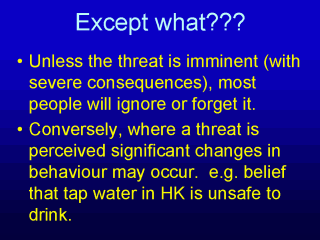 |
Factors determining whether
people change their behaviour in the face of a threat include imminence (how soon the
threat will materialize). Threats that are likely to have an imminent impact will be more
likely to motivate change in behaviour than will threats that will not manifest until 20
years later. As most health threats fall into the latter category of long-term threat,
threat itself seldom generates the motivation to change. Events which trigger threat may
be much more effective. For example, a heart attack in an otherwise well individual may
promote a rapid change in behaviour because it represents a relatively unpredictable
manifestation of an unanticipated threat. It could happen again at any time. But to many
young adults, the hazard of lung cancer from smoking cigarettes may be 20-40 years away,
plenty of time to change their behaviour, and so they may continue to smoke without any
worries. The converse is also true. Where the perception of a threat exists,
particularly when the manifestation of the hazard is uncertain, then behvaior changemay be
maintained or reisted, despite the absence of any actual hazard inherent in the behaviour.
Can you think of an example in HK? A good one is the belief that tap water in HK is not
suitable for drinking, but must be boiled first. How many of you have been told by your
family not to drink tap water unless it is boiled? |
